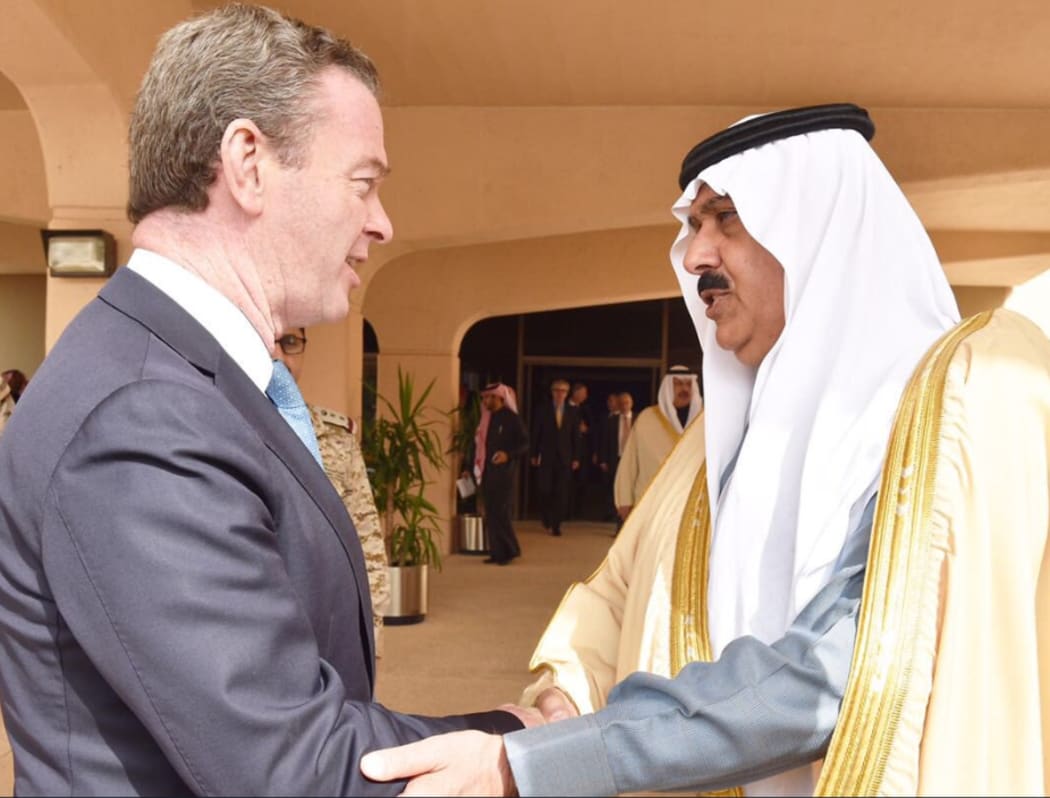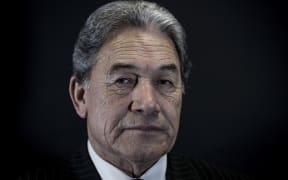The Australian government is providing tens of millions of dollars to a Canberra defence company exporting a next-generation weapons system destined for Saudi Arabia, a country at the centre of a growing international furore over its complicity in war crimes in Yemen and the brazen murder of journalist Jamal Khashoggi.

Christopher Pyne with Saudi's then-Minister of the National Guard in 2016. Photo: Twitter / @cpyne
The government provided more than $36 million in financial assistance and Defence Minister Christopher Pyne has spent years lobbying the Saudi Government on behalf of Australian defence companies - support acknowledged by the company in question, Electro Optic Systems (EOS).
"Christopher Pyne MP has visited foreign capitals with me to provide assurance of Australia as a reliable defence partner and supplier to its allies," a statement from EOS chief executive Ben Greene last year noted.
"This effort and support is acknowledged."
EOS' Remote Weapons System, or RWS, is a platform that holds military cannons, machine guns and missile launchers and can be mounted on small military vehicles or naval vessels.
It can then be remotely operated by a soldier who stays safely inside.
A company document seen by the ABC shows Australia is helping a local company sell weapons systems destined for Saudi Arabia.
The revelation comes amid an international move away from military support for Saudi by Australia's major military allies, the US and the UK.
The Saudi-led coalition is accused of indiscriminate airstrikes and military offensives that have killed thousands of civilians.
The Australian director of Human Rights Watch, Elaine Pearson, said the government needed to be more open about sales to Saudi.
"The Australian Government has been saying repeatedly: 'Trust us, we're abiding by the terms of the arms trade treaty, we're abiding by our human rights obligations'," Ms Pearson said.
"But the reality is we simply don't know because there is no transparency.
"I think we'd like to [have] a bit more transparency about what weapons have been provided to Saudi Arabia, the quantities of equipment and how do we know that those weapons are not ending up on the battlefield in Yemen."
Secret document reveals details of Saudi deal
The ABC has seen confidential EOS board minutes, which describe signing a Letter of Intent (LOI) for the sale of 500 remote weapons systems units for the Saudi Ministry of Interior.
The minutes reveal the company agreed to provide the RWS for use by Saudi Arabia in lots of 20 units from that year.
EOS has a business arrangement with US arms manufacturer Orbital ATK, via which the RWS is supplied to Saudi Arabia.
EOS's chief executive Ben Greene said they provided their weapons system to "the USA", and declined to say whether the end user was Saudi Arabia.
He added: "Since you mention MOI, it is worth observing that in [Saudi Arabia] the mandate of MOI (Ministry of Interior) stops at the sovereign border, so by definition no defence items provided to MOI by anyone would be deployed to Yemen."
He said it was his understanding nothing produced by EOS would end up in Yemen.
"EOS has no involvement in Yemen, no equipment in Yemen, and we have no end-user of EOS equipment that is likely to deploy it to Yemen," he said.
The board minute also refers to EOS receiving funding in 2017 from an entity known as "PIC".
This is likely a reference to the Department of Defence's now defunct Priority Industry Capability Innovation Program, or PICIP.
A publicly available PICIP document reveals Defence provided EOS $3.7 million between 2013 and 2016 for their RWS system.
That is on top of the more-than $33 million that the Australian Government's export credit agency, Efic (Export Finance and Insurance Corporation), provided to EOS last year in performance bonds connected to the RWS.
Last week the US House of Representatives voted to end American military assistance for Saudi Arabia and its allies fighting in Yemen.
On Saturday, a committee of the UK's House of Lords declared the British government was on the wrong side of the law by selling arms to Saudi Arabia.
Former military officer and defence analyst Rodger Shanahan said the government should always weigh the risk of selling defence items overseas.
"When you're exporting to an area - particularly (the) Middle East where there is a history of conflicts, and some of the nature of the conflicts can be quite murky - you have to be quite confident in yourself that materiel … that you export is not going to be used in conflicts where there might be some reputational damage suffered by Australian exporters," he said.
A spokesperson for the Department of Defence said all export applications considered by Defence were "subject to rigorous risk assessment processes that consider Australia's international obligations, including the Arms Trade Treaty, as well as considerations relating to foreign policy, human rights, national security and regional security".
"The Arms Trade Treaty assessment includes consideration of whether there is an overriding risk that the exported items could be used to commit or facilitate a serious violation of international humanitarian law or human rights law," the statement said.
EOS is an Australian defence and space technology company with ambitions to become the world leader in next-generation remote weapons systems.
It has spent years developing the Remote Weapons System, or RWS, with the US and Australian militaries.
Such systems are a collection of sensors, cameras and lasers set around a small cannon, heavy machine gun, missile launchers or a combination of all three.
They are built onto a swivelling mount that can be affixed to the roof of a military truck or the deck of a naval vessel and fired while the user is safely inside a vehicle.
It can find targets up to several kilometres away and once a target has been acquired, it can lock on a continue-to-fire with minimal human involvement.
In January last, EOS announced a $410 million deal to supply the RWS to an "overseas customer".
Both the government and EOS declined to state who the customer was, saying it was not in Australia's national interest and due to commercial-in-confidence concerns.
In December, the ABC revealed that the customer was the United Arab Emirates.
At the time EOS said its equipment "has no role in Yemen" and that it was not the recipient of export licences that would allow it to export defence equipment to the UAE.
However, two days ago the UAE Armed Forces confirmed it was the customer at a press conference at the IDEX international arms fair in Abu Dhabi, and EOS released a statement confirming that they were indeed selling to the UAE, and that deal was now worth $450 million.
"This announcement confirms EOS as the largest global provider of remote weapon systems," Dr Greene said in the statement.
Australia seeks to promote overseas arms deals
Australia's defence exports to Saudi Arabia and the UAE are likely connected to a plan announced by then-prime minister Malcolm Turnbull in January last year to drastically increase defence sales over the next decade called the Defence Export Strategy.
Australia will spend $200 million between now and 2028 as part of a plan to become the 10th-largest arms exporter in the world. It is currently ranked 20th.
The strategy states the Middle East is a "priority market" for defence exports.
- ABC



